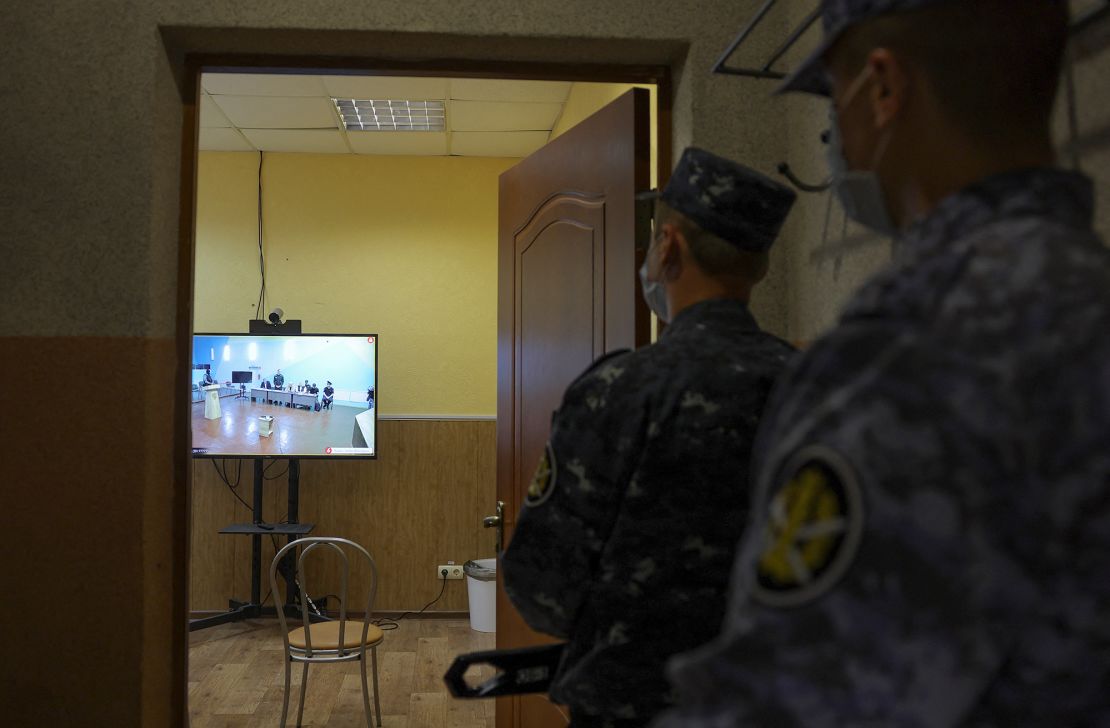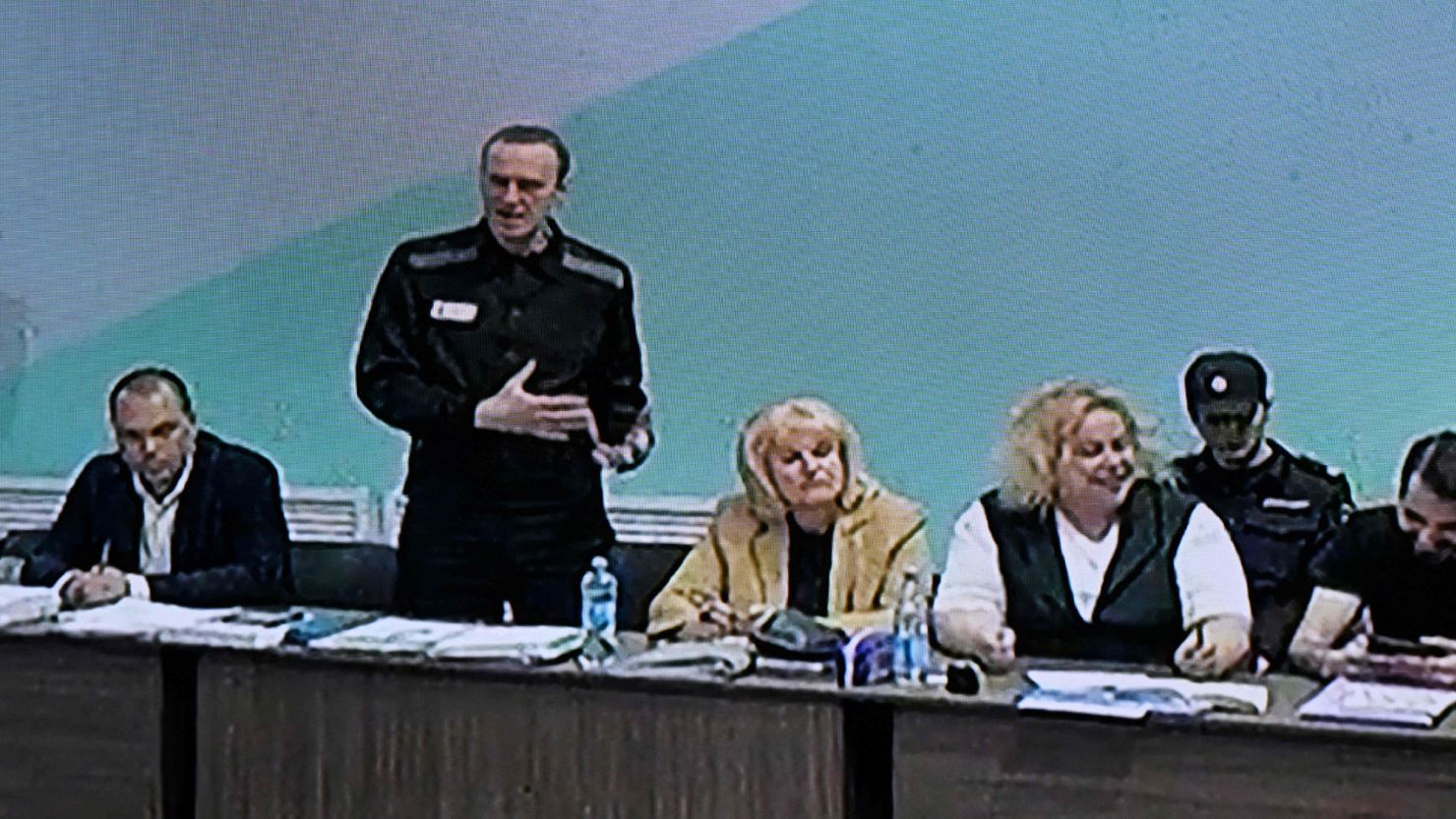Jailed opposition leader Alexey Navalny appeared before a Russian court Monday to defend himself against fresh charges of extremism, in a trial that could extend his prison term by decades.
Navalny, already serving sentences totaling 11-and-a-half years in a maximum security facility, was charged in 2021 with the alleged “creation of an extremist community,” according to a report that year from Russian state media TASS.
He and his supporters claim that his arrest and imprisonment were politically motivated, intended to silence his criticism of Russian President Vladimir Putin. Just hours after the trial began, Navalny announced the start of a campaign aimed at turning Russians against the war in Ukraine.
In comments posted to his Twitter account, Navalny said the “absurd” charges could lead to him serving a further 30 years behind bars.
Navalny, 47, dressed in black prison garb, appeared at his hearing in person in a court room at the IK-6 penal colony at Melekhovo, around 155 miles east of Moscow.
Journalists were not admitted to the court room, instead having to follow proceedings through a live stream with poor audio quality. Navalny’s communications team has complained about not being able to hear what is being discussed, and called the proceedings an “incredible mess.”
In comments posted on their Telegram account, Navalny’s team criticized the court for organizing a “live streaming with a monstrous sound, where the meaning of what is happening can be guessed only by isolated words, all the while calling the process open.”
His team also alleged that the press secretary of the Moscow City Court thought the meeting was closed, and had failed to get into it.
The proceedings were held behind closed doors because the court voiced “fears of provocations against the participants in the process,” according to TASS.
Sitting at a long table with his lawyers Vadim Kobzev, Olga Mikhailova and Svetlana Davyodva, Navalny asked for his parents to be allowed into the hall. Judge Andrey Suvorov said he will consider the request later.
Navalny’s team challenged judge Andrey Suvorov, and asked him to recuse himself, according to the team’s Telegram posts. It was not immediately clear on what grounds they asked for the recusal. The judge refused the request.
His team also questioned the location of Navalny’s hearing.
“In a normal situation, a person convicted for the period of a new criminal trial is taken from the colony to a pre-trial detention center, and the hearings take place in the courtroom. But with Navalny, of course, it is more beneficial to hold a trial 250 kilometers from Moscow and 70 kilometers from the nearest large city – Vladimir,” the team said on Telegram.
Also present at the hearing is Daniel Kholodny, the former technical director of the Navalny Live YouTube channel, accused in the same extremism case.

Lilia Chanysheva, the former coordinator of Navalny’s headquarters in the western Russian city of Ufa, was sentenced to seven-and-a-half years in prison last week, after being found guilty of “organizing an extremist community.”
Throughout the trial, Chanysheva maintained her innocence.
“I am engaged in ordinary public political activities, to which I have every right under the Constitution,” she said following the announcement of the verdict. “What is illegal is this justice that is happening.”
Navalny has been incarcerated in Russia since his return to the country in January 2021, on charges of violating terms of probation related to a years-old fraud case, which he dismisses as politically motivated.
He had previously been taken from Russia to Germany in August 2020, after he was poisoned with the Soviet-era nerve agent Novichok. Navalny arrived comatose at a hospital in Berlin, following a medical evacuation flight from the Siberian city of Omsk.
A joint investigation by CNN and the group Bellingcat implicated the Russian Security Service (FSB) in Navalny’s poisoning, piecing together how an elite unit at the agency had followed Navalny’s team throughout a trip to Siberia, when he fell ill.
The investigation also found that this unit, which included chemical weapons experts, had followed Navalny on more than 30 trips to and from Moscow since 2017.
Russia denies involvement in Navalny’s poisoning. Putin himself said in December 2020 that if Russian security services had wanted to kill Navalny, they “would have finished” the job.
After his latest trial began, the opposition leader announced the start of a new campaign aimed at generating Russian opposition to the war in Ukraine, according to a statement published on his official website.
“I want to use this day not to arouse sympathy for myself and other political prisoners. I want to call everyone to action and use this day to announce our new, very important project. Big agitation machine. Truth machine. We do not just want to do it, but we will definitely do it in order to join forces in the fight against Putin’s lies and Kremlin hypocrisy,” said Navalny, according to the statement.
Agitators involved in the campaign will conduct telephone surveys and communicate with Russians on instant messenger apps and “Kremlin-controlled social networks” in an attempt to persuade Russians to vote against the war.
“We will conduct an election campaign against the war. And against Putin. Exactly. A long, stubborn, exhausting, but fundamentally important campaign, where we will turn people against the war,” Navalny added.
CNN’s Katharina Krebs contributed reporting.




